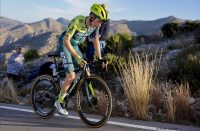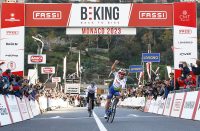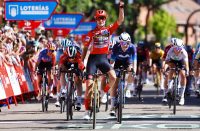Story and Photos by Christine Vardaros
September 23, 2014
The moment I got confirmation that I was invited to participate in China’s QianSen Trophy Cyclocross Yanqing Station race, my head immediately exploded with nervous excitement. My travel had been extensive, yet limited to Europe and North America. What would it be like to travel with my bike to a land as unfamiliar as China? Will I get by with English? Is it allowed to walk around a communist country unescorted? Will there be loudspeakers everywhere blasting propaganda that I cannot understand? Am I to stop and pretend to listen? Will the racing venue be run as I am used to? And what about my vegan sport diet? How do I say to hold the fish sauce? Good thing I like rice.
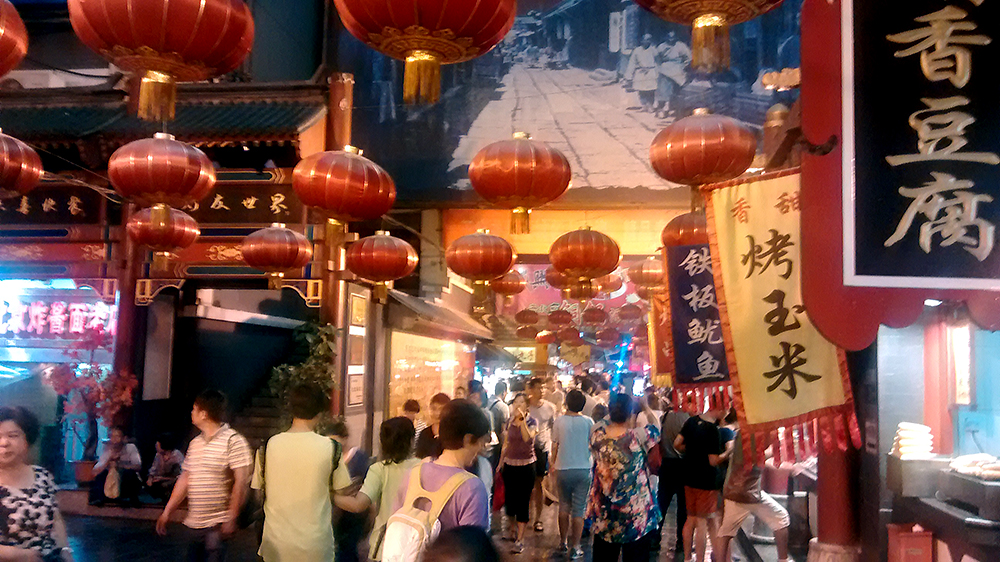
Luckily, I did not have to face these challenges alone as I was able to bring with me a few folks from the Western world, my husband Jonas Bruffaerts and fellow racer Ellen van Loy [Telenet-Fidea] from Belgium, as well as Thijs Al and his girlfriend from Holland, along with their baby. Thijs had been to China last year and won this event; the rest of us had no idea what to expect. All we could get out of him beforehand was that this would be a trip we’ll never forget. But first we’d have to get our visas.
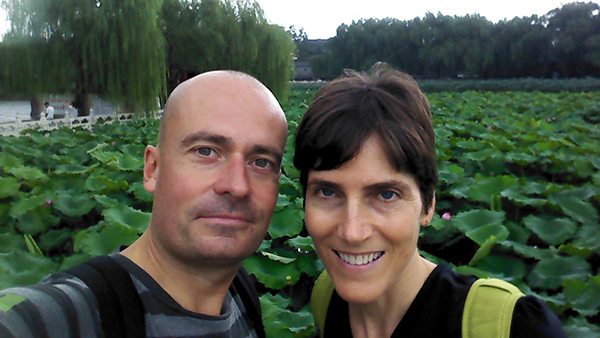

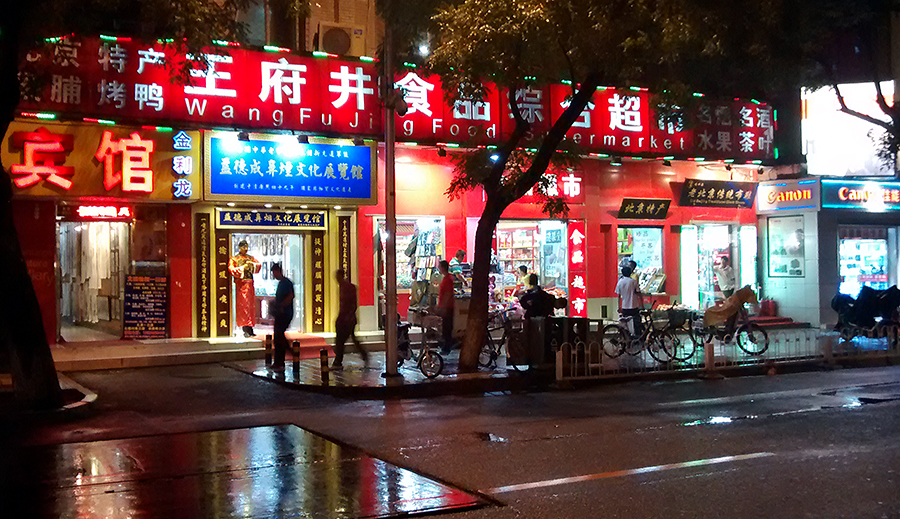
After a long ten hour flight to Beijing from our homeland of Belgium, Ellen, Jonas and I were greeted by smiling faces holding a large “QianSen Trophy Cyclocross Yanqing Station” sign. Thijs was to arrive later in the day. Piled into a large bus, we weaved through crazy traffic; if you looked out the front window, you couldn’t see actual lines of cars on the road. Instead it more resembled a Jackson Pollock painting, where cars scooted about in no cohesive flow. We saw many near misses before arriving safely at the Beijing Jinyu Badaling Spa Resort.
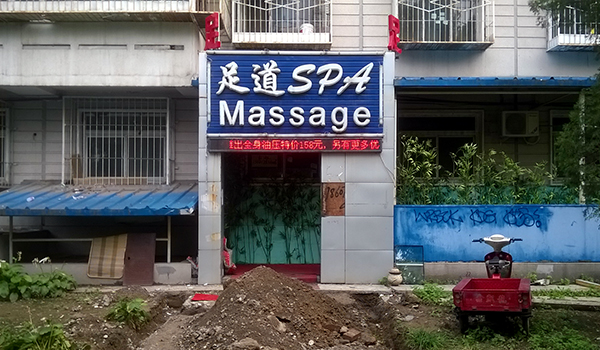
(Not the same spa!)
Let the Adventures Begin
Once inside, we were welcomed by more smiling faces ready to check us in and drag our heavy oversized luggage to the rooms. It was quite amusing to see women half my size competently manhandle the luggage like they were made of pillows.
Mealtimes were much of the same, where we were helped by friendly, accommodating folks. Everything was labeled in English so we knew what we were eating – mostly Chinese food, with a few athlete-specific entrees like pasta with tomato sauce. Breakfast was pretty much the same as the Chinese typically start their day off with savory foods like rice and stir-fried vegetables, soup or steamed buns filled with meat or vegetables. For Westerners, they had breads and jams and peanut butter for the visitors so they’d feel right at home. We were also treated to a fairly new beverage in China…coffee.
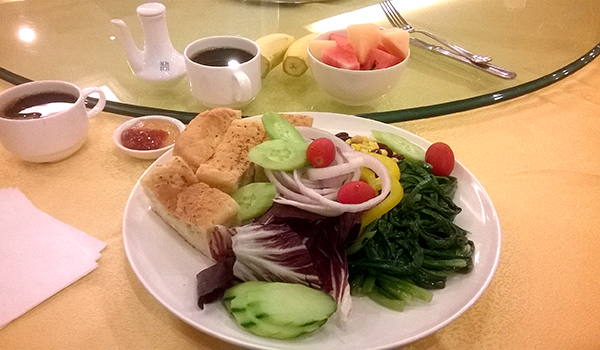
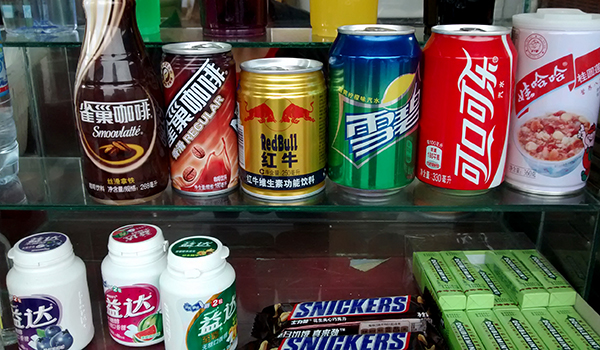
The organization was so incredibly supportive and accommodating that it was easy to forget that we were in fact in unchartered Eastern territory. That was until we headed out with our bikes, unescorted, to the race course.
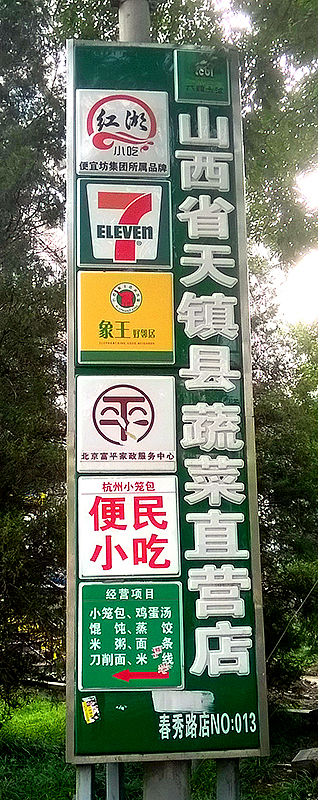
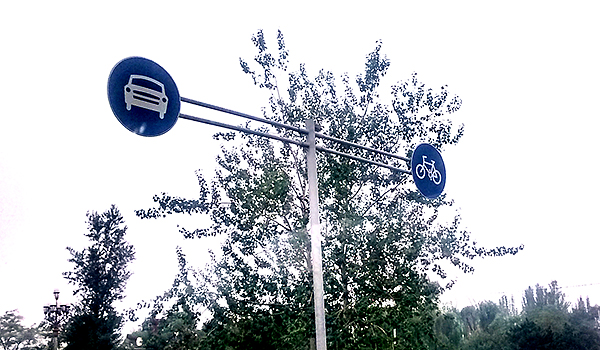
First Culture Clash
All the roads that took us to the race course had separate bike paths. While that initially excited us, we weren’t prepared for the type of non-car traffic we’d encounter. Aside from the odd “normal” bike, there was a wide array of two-wheeled and three-wheeled vehicles heading in every direction imaginable. There were bikes, scooters, tricycle scooter taxis with awnings made of random materials, or those with built-in flatbeds or fully enclosed carrying containers intended for passengers or heavy objects. Wide ones, skinny ones, fast ones, slow ones, swerving ones, and confused ones that must have had a purpose that was lost on us. All these vehicles were fully electric, which made them earth-friendly but also almost impossible to hear aside from their incessant honking.
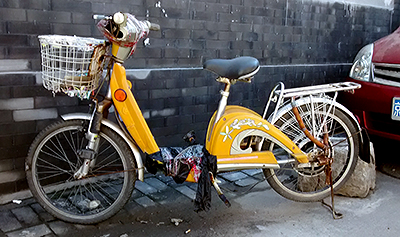
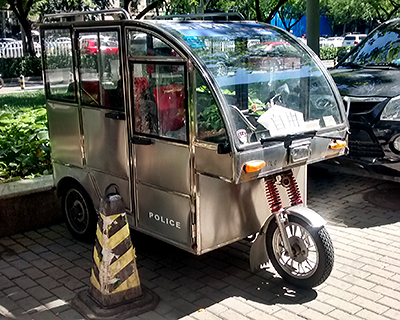
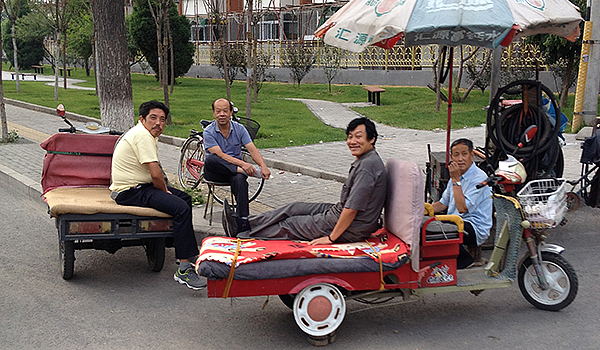
It was pure chaos…or so it appeared to us, but they didn’t crash into each other. When we threw ourselves into the intricate transport flow, we experienced our first cultural clash, literally. One of the racer gals got caught up and hit the ground. Luckily she only sustained a minor cut and maybe a bruised ego.
At the race site, we re-entered our comfort zones. The advertising panels may have been different, the spectators Chinese, but dirt is dirt…or so we thought. Their dirt that lined the course was like no other I’ve encountered. Even after the worst of rainstorms, it stayed completely dry. It was also hardened into chatter-bump formation throughout, leaving our forearms screaming for relief, while the saddle smacked our butts more times than you’d expect from a visit to the red light district in Amsterdam. Even so, every one of us finished our rides grinning from ear-to-ear. We were in China racing our bikes, what more could we ask for! After conquering the rough track elements, we were that much more prepared to take on Chinese bicycle path rush hour traffic back to the hotel.
Great Wall
Our second cultural shock was not the Great Wall of China, where the organization kindly took us on tour, but the toilets we had to use at the base of the wall just before our ascent to the top.
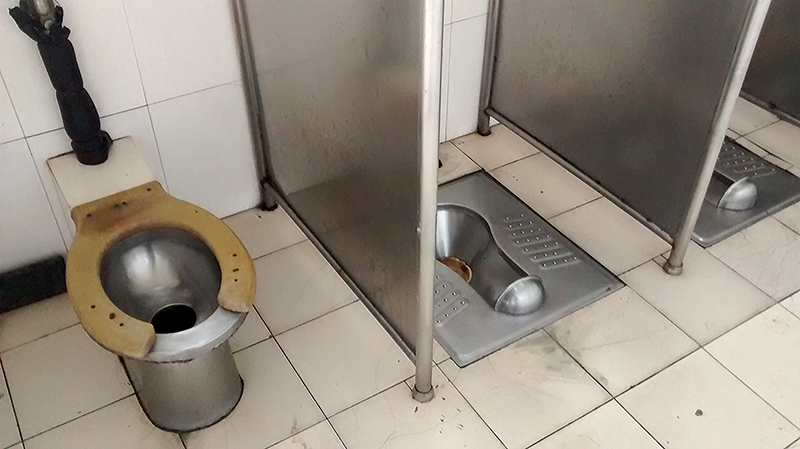
While those who’ve been to countries like France, these special toilets may not be a shock, but for the rest of the Westerners, squatting to pee into a hole in the ground with built-in foot platforms on either side is a strange experience. It is also a bit trying for the competitive cyclist who is always trying to save her quads for the big day. And as is usually common, it was byoTP (bring your own toilet paper), which you don’t realize until it’s too late.
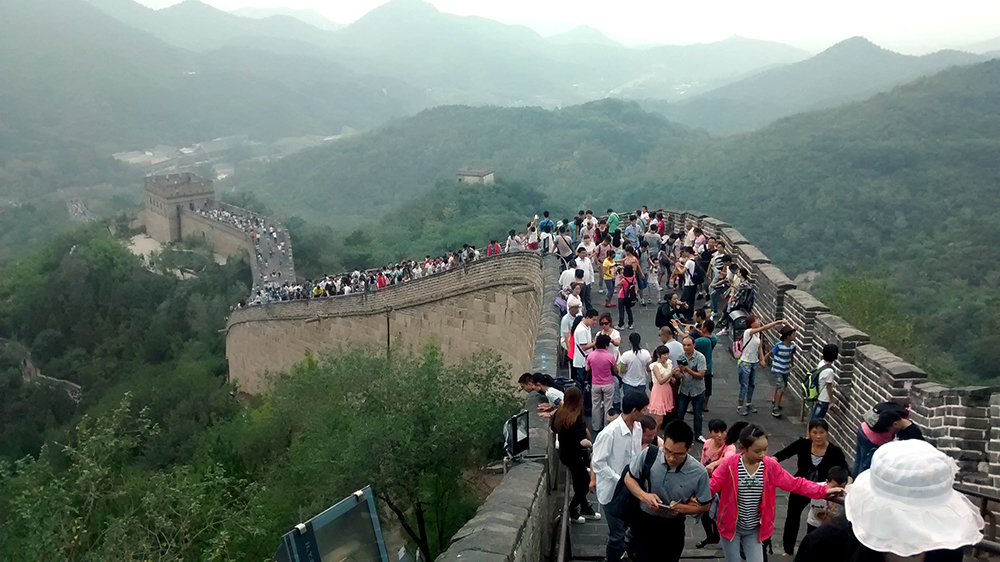
As for the Great Wall, we were all overwhelmed by the enormity of it. Constructed out of stone, brick, wood and earth, the wall dates back to as early as 7th Century BC. It spanned from east-to-west across the historical borders of China to protect the Chinese Empire against intrusions coming from the North. The section we visited in Badaling was the most famous for tourists, as we could easily tell from the plethora of gift shops at the wall’s entrance. Did you know that those who died while constructing the wall were simply buried within it? Hence, the Wall’s unofficial nickname is the “longest graveyard in the world.”
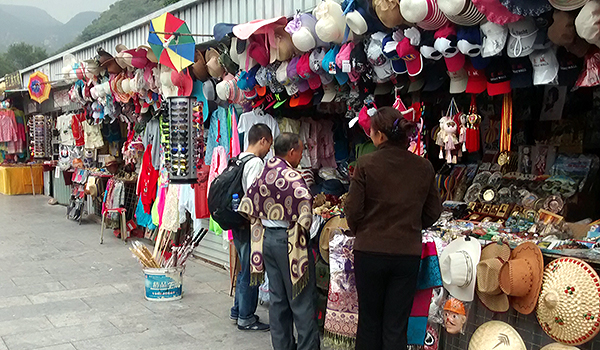

While meandering up the super steep grooved stone steps, one could hardly ignore the clashing neon compression socks scattered about the mainly Chinese crowd. The higher you walked, the more exciting the views, but also the more determined you became to spot other competitors from your category so you weren’t the only one with sore legs in the race the next day. As long as it is an even playing field, we reminded ourselves.
Night Before
The night before the event, the organizers set up a traditional Chinese dinner festival, complete with lazy Susan turntables filled to the max with all sorts of exotic specialties. Many of the cyclists made an effort to taste each and every one of them; a few of us –Jonas and I the longtime strict vegans – kept to the vegetables. They also served traditional alcohol that was just as unrecognizable to give the riders the full effect.
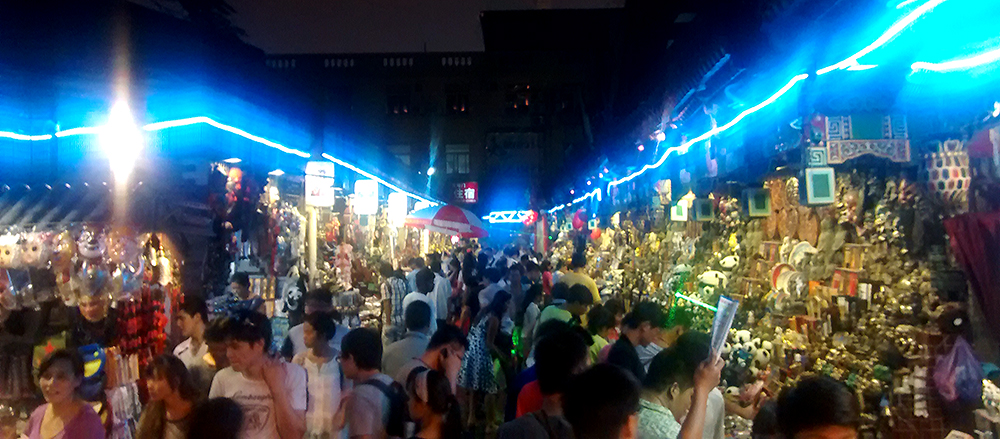
Race Day
The next morning was the first time my nerves finally kicked in. I may be in a strange land, collecting all these wonderful memories, but there were UCI points on the line. In the two days of training leading up to the race, I mainly rode with Ellen, sticking to her wheel like glue. This gave me a solid feeling entering the race, considering as 6th ranked in the world she was the pre-race favorite. My goal was the podium – 3rd place to be exact, since I expected that either Lucie Chainel or last year’s winner Margriet Kloppenberg would take 2nd.
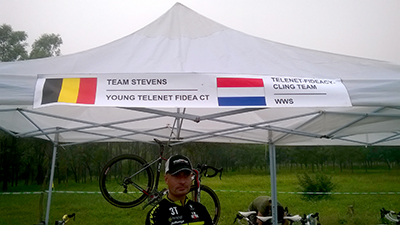
When we showed up to the venue, we were greeted by a large collection of tents, each labeled with the names of the teams they were to shelter for the afternoon. It was such a cool experience to have our very own labeled tents that most of the team name stickers were removed by the riders after the event and nicely rolled up to take home as special souvenirs.
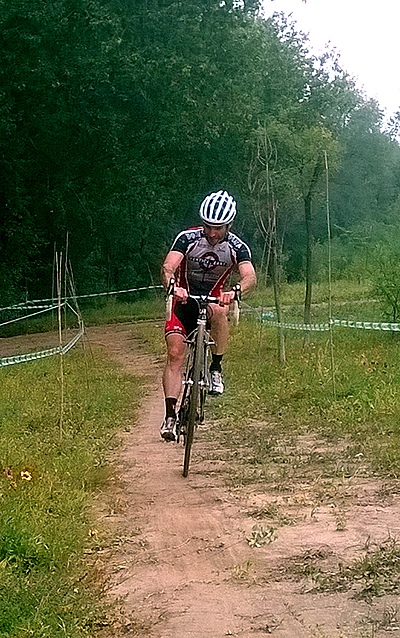
After the whistle blew (as the race gun didn’t make it on the plane from Belgium) for the women’s event, I took off hard to make up for my sub-par line-up. Just when I had the lead group in sight, the unthinkable occurred. A wasp landed on my arm and stung me for what felt like a full ten seconds. Shortly after, my breathing started to become difficult. I knew from previous experiences that, as long as I stay calm, I have a certain amount of time before either I stop breathing or my heart stops so I stupidly finished the race, albeit very slowly.
Afterwards, the organization quickly delivered me to the hotel so that I could take my medication. I got to it just in time – two minutes later would have been too late. While I may have only finished 9th, I am surely thankful to be alive to tell the tale. I am also glad I didn’t die on the poor gal who escorted me to the hotel as she was already freaking out that I was on my last few breaths. Then there would have been Jonas to consider. He would not have been pleased that he’d have to carry two bikes, our luggage and an extra box that probably doesn’t come with wheels.
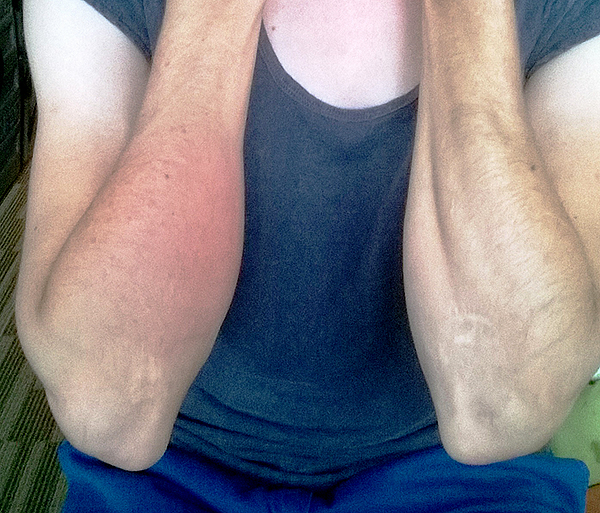
Lesson learned. Now I go nowhere without an Epipen and Zyrtec followup pills. At the insistence of Jonas, I now keep my unruly Greek arm hair buzzed so no creatures can get tangled in my hair again. The highlight of that fateful day was that my travel mates Ellen and Thijs won the races. I loved hearing all about pro mountain biker Carl Decker’s improvised race equipment that rode him to 5th place. “It took me 48 hours to get here. As my stuff took an even slower time to arrive, I’ve had to borrow everything from bikes to underwear. Yes, I’m wearing Ryan’s [Trebon] underwear…but not during the race [laughs]. For that I used Molly’s [Cameron] bib shorts. I then borrowed a bike and cleats from a photographer. In a group, somebody’s always gonna get screwed so it’s my turn,” quipped Decker.
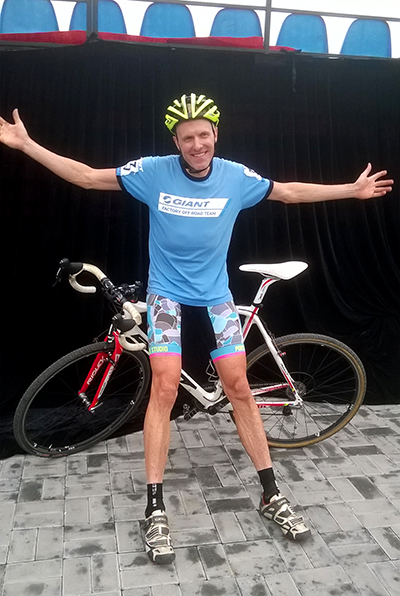
In the evening, the organization hosted a final celebratory event. Too bad I had to sit that one out, but based on the stories I heard, it sounded like a wonderful close to a successful race day!
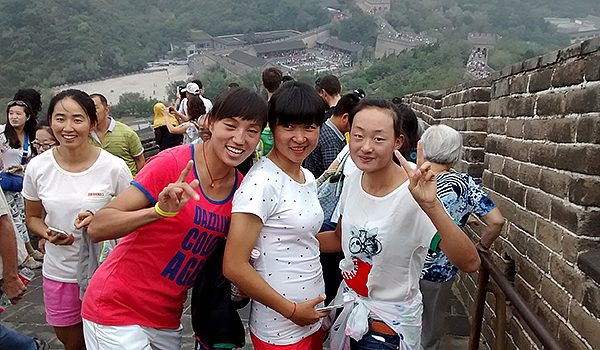
Next up – Beijing
At the conclusion of the racing segment of our Chinese adventure, the organization piled us once again into buses to take us onto our final destination. As we pulled out, a whole line of folks warmly waved goodbye, like parents do when their kids set off for camp. While Ellen was returned to the airport, the Thijs-family, Jonas and I headed to Beijing for a few days to play tourist. We were dropped off at the Holiday Inn Express in Dongzhimen, located in the center of town.
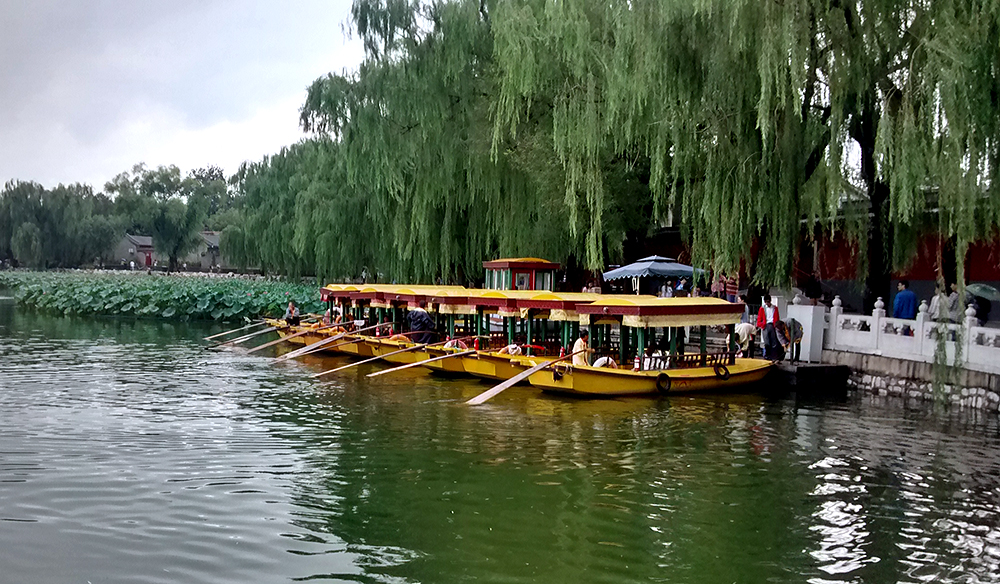
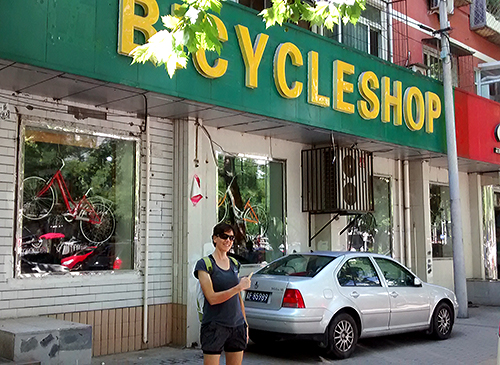
Just after our arrival, the race organization helper walked me over to a pharmacy located a mere five-minutes away so that I could collect “green oil” to help alleviate the overbearing itchy feel left by the wasp sting. This was according to my fellow cycling friend and China expat Paul Gissing who originally put me in contact with the race organization. On our way there, we trekked through two construction-type zones, passed a random camouflage tent next to the street seemingly doubling as a house, saw a handful of stores that look more like disheveled storage rooms and were almost run over exactly twelve times by three expensive-looking cars, two electric bikes, one electric scooter with built-in platform to tow people, one with homemade cardboard awning, two town bikes, and three pedestrians. By the time we reached the pharmacy, my eyes were wide open, sweat beading down my back, adrenaline pumping through my veins. My guide, on the other hand, was completely un-phased by it all. Minus the hole-in-the-ground toilets, this pretty much summed up what we were to expect for the rest of our adventure. The days of VIP treatment were now officially behind us.
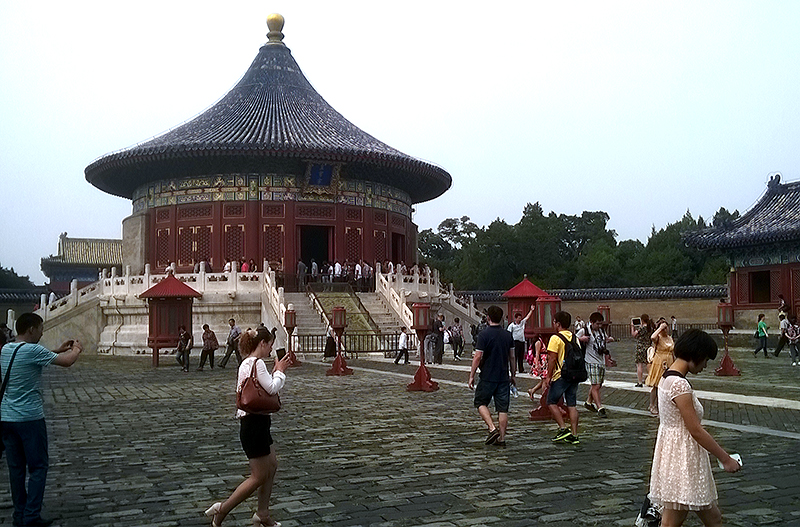
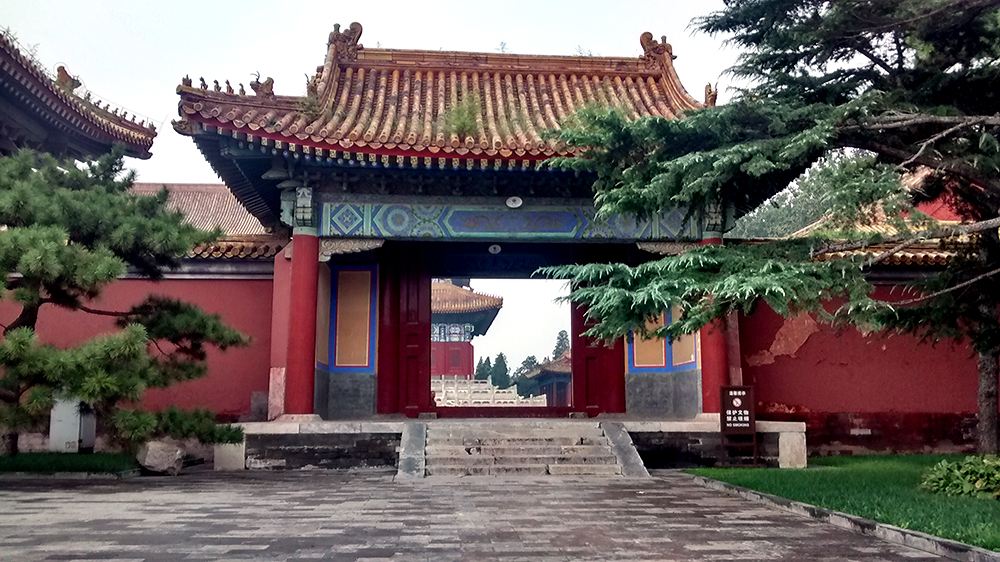
Over the next four days, we visited a plethora of temples, squares, and parks that after a while all turned into a beautiful blur of ornate edifices, one after another. There were a few, though, that stood out from the rest.
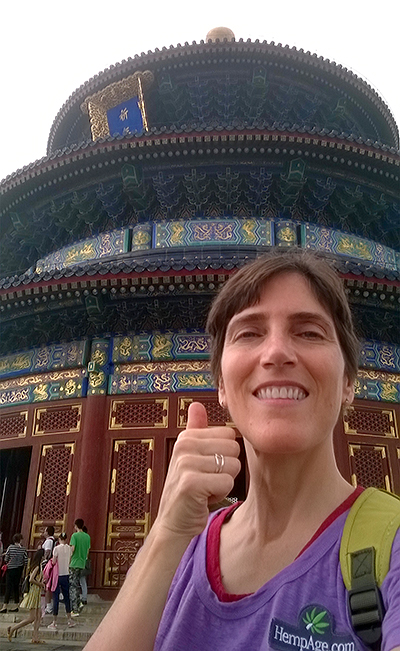
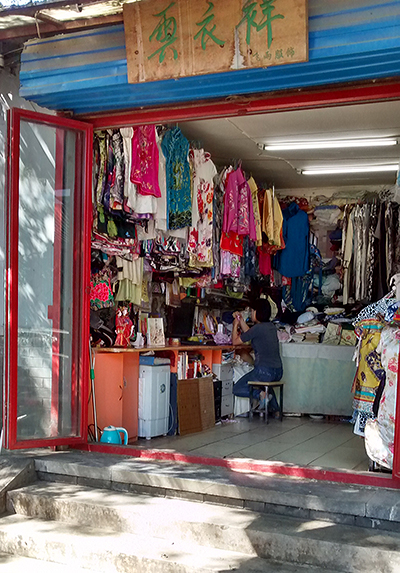
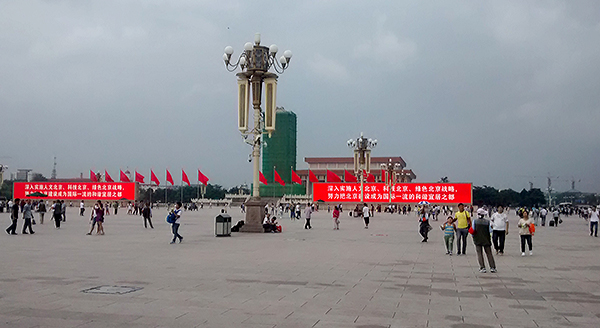
The park of the Temple of Heaven had the greatest impact on me. Not because the temples or squares were more grandiose than the rest, but because I was able to experience two other aspects of history that this place encompassed. The first was the steady blue line that ran through the middle of the park that was used by the Olympic Marathon runners back in 2008. The second was the spattering of loudspeakers that belted out a steady stream monotonous speech. I knew that there had theoretically been a revival to the loudspeaker system similar to that made famous by Chairman Mao Zedong (founder of the People’s Republic of China, whose photo can be found throughout Beijing) who used this method to spread his propaganda to the masses, but I wasn’t sure how widespread it was now and if I would encounter any. Our first thought was that they are maybe telling the visitors that they can’t walk on the grass, but what I later learned was that it was indeed the same loudspeaker system but now, in addition to the typical propaganda reminding the folks to be civilized, polite Beijingers, the speeches include useful bits like weather reports, tips to fight diabetes, how to achieve correct walking posture and how to grow vegetables. The loudspeakers belt out messages every day at exactly 7am, 11:30am and 6pm.
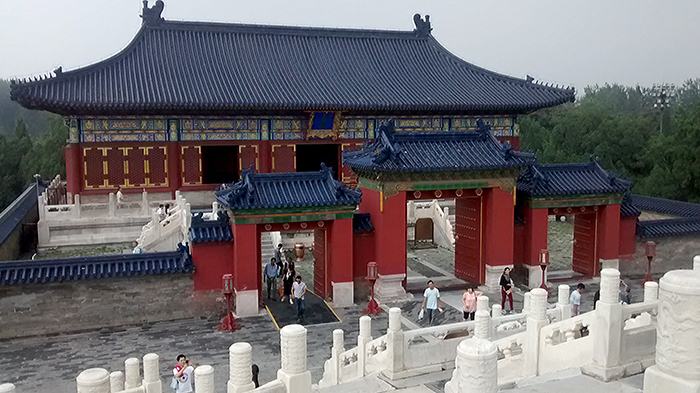
In Temple of Heaven, the audio effect was accompanied by a big screen television with commercial advertisements between messages.
Another historical site that moved me was Tienenman Square. It was a strange feeling to know I was standing in the exact spot where the 1989 Tienenman Square massacre took place. A million people, mainly students, stood here to fight for government accountability, freedom of the press, freedom of speech, and the restoration of workers’ control over industry. It was hard to imagine what it must have been like back then as I looked around and saw everyone dressed in trendy clothing, faces down, busy looking at or typing on their cell phones.
On our third day in Beijing, Jonas and I retreated to Beihai Park where its palaces and temples were outweighed by its serene lake and gardens. It was originally an imperial garden dating back 1000 years. We spent a good two hours simply sitting by the side of the lake staring at the water, and thinking that this is a great place to ride our bikes.
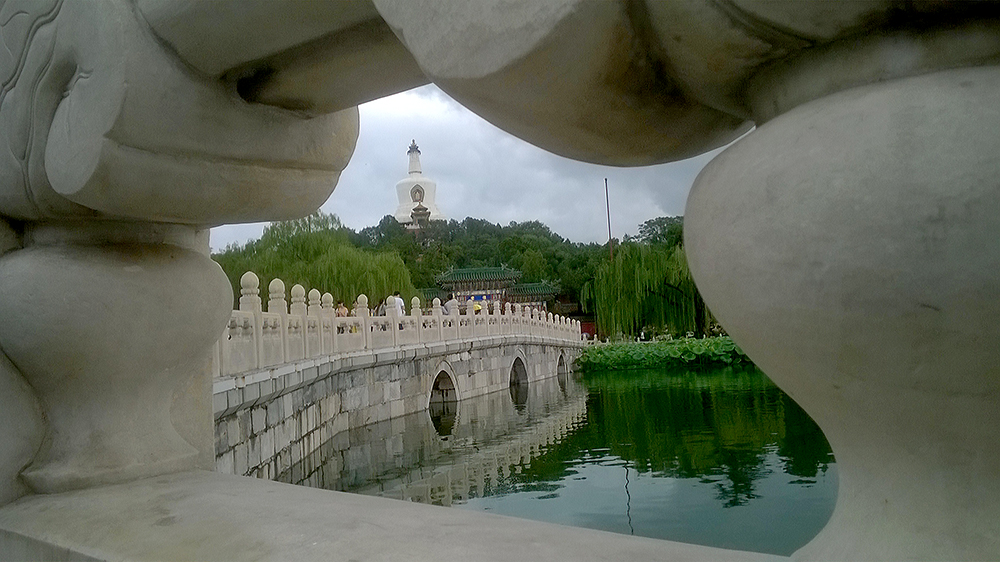
Located very near to the Beihai Park is the Forbidden City. This was the one tourist attraction got away. According to the map, we circled around it three times. Jonas now calls it the Hidden City.
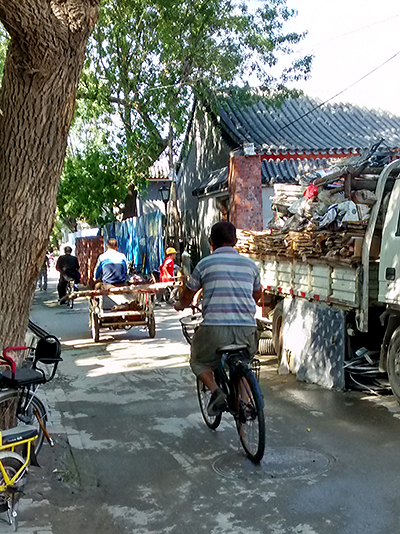

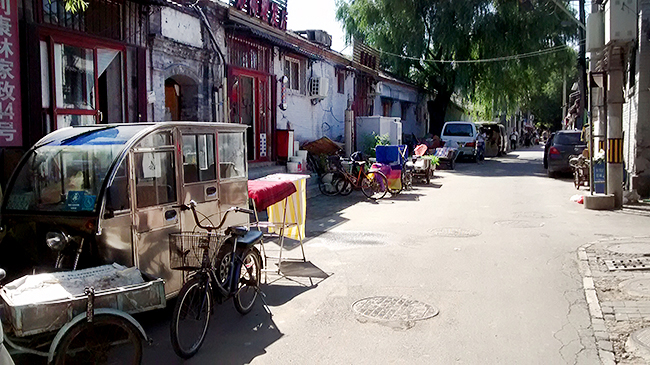
Our favorite of all that Beijing had to offer was definitely the Hutong neighborhoods that depict how Beijing used to be many years ago with its narrow alleys and streets weaving through crowded residential areas. While some of these Hutongs clearly had a facelift to accommodate the tourists, westernized restaurant names and products to offer like Belgian beer and cappuccino, some remained untouched. Naturally we had to check out both types. First we had mojitos at Lazy Café, then, moved onto a tiny disheveled store with two stools out front for iced green tea (unsweetened as is typical in China) and beer. As we sipped our drinks, the woman offered up samples of her dinner she was preparing outside on the street alongside where we sat.
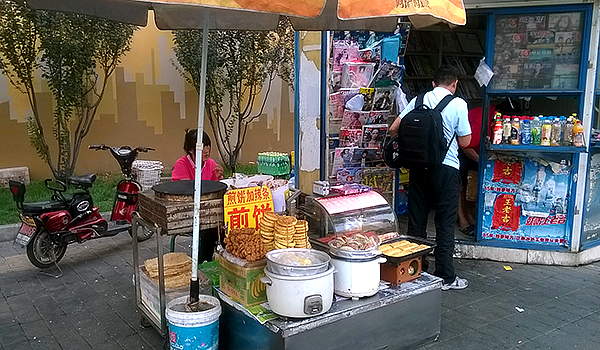
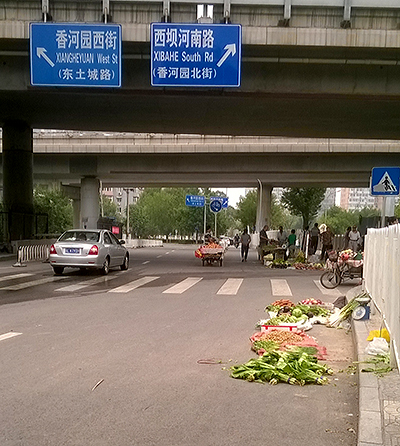
Overall, what I found most strange was the dichotomy between tourist attractions and real life in Beijing. When not meandering through the temple squares or perfectly groomed parks, we were trekking on cluttered, dirty streets lined with small stores filled to the rim with product or produce. Some of the streets were so cluttered that we found it a challenge to get through them. Many of the stores we didn’t dare attempt to enter for fear that we’d never find our way out again.
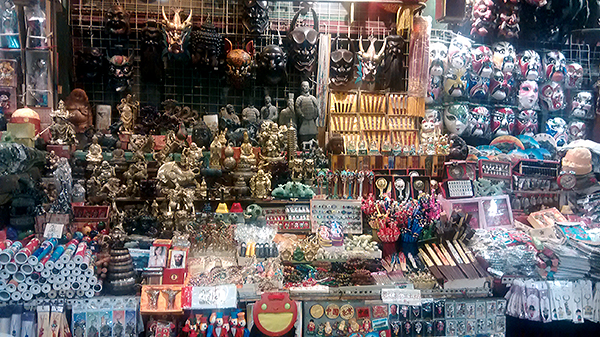
What we quickly discovered, though, was that there were enough “window” shops for drinks that you never had to enter one of the walk-in versions if you’re not up for that sort of adventure. And with so much to drink, finding a toilet is never a problem as there are toilets every few meters in every direction you walk. I found out later that this is because the houses have no private toilets, meaning that these “public” toilets are also their private everyday ones as well. So if you enter one – usually without doors – and feel uncomfortable peeing alongside someone already in squat position, you can walk a few meters and try again. Many of them were also equipped with a “handicapped” sitting toilet option intended for Westerners.
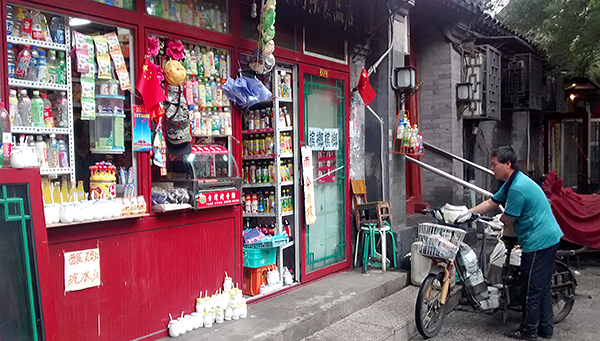
Good thing the bathrooms are also in abundance in the infamous Night Market district, considering all the strange foods they had up to offer. Table after table served “delicacies” such as starfish, sea horses, scorpions, snakes, centipedes, tarantulas, silkworms, live baby scorpions…still wriggling, all on sticks and ready to eat. As a vegan, I didn’t walk away empty-handed though. I got myself steamed vegetable dumplings, with a stick on the side. To make sure my food had no surprises as cyclocross season is just getting started, I showed the guy my paper with specific Chinese instructions of what I will not eat. This paper also came in handy when we wanted to eat at local restaurants instead of at the tourist spots or veggie-only places.
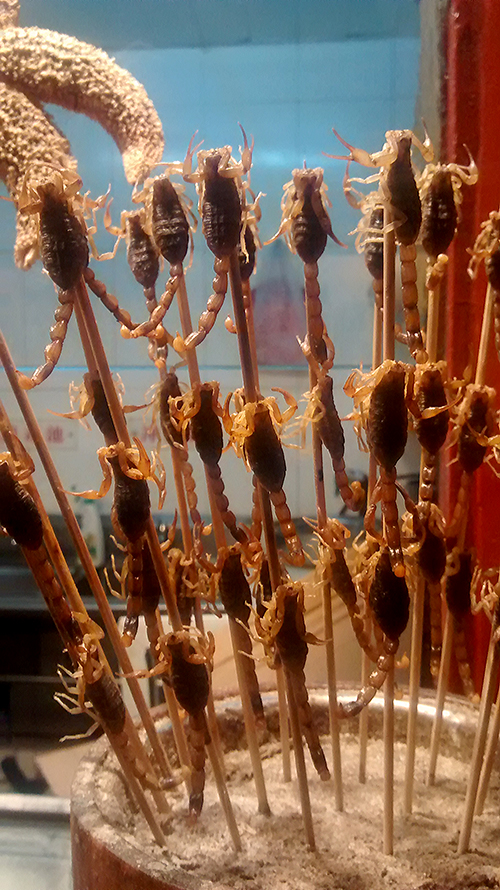



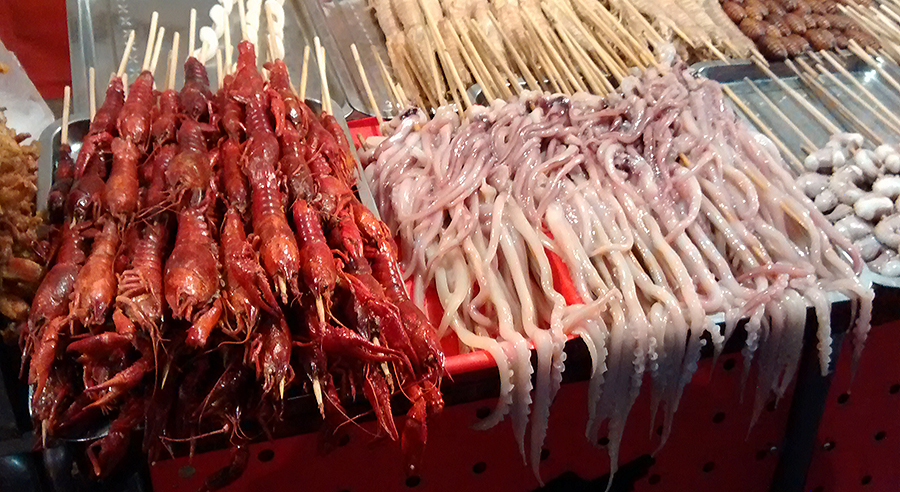
Buried between the exotic foods stands at the Night Market were trinket stores, selling everything from beaded jewelry to mini ceramic Buddhas. Thankfully we had already honed our bargaining skills the day previous during our purchases of cantaloupe slices on a stick. The first time we saw such a fruit cart, I asked a woman standing alongside it with cantaloupe in hand how much she paid for it. Knowing that it costs five Yuan for two pieces, I was ready to pay the same. But when the vendor gave me only four Yuan back from my ten, I gestured to him to give me one Yuan more. He gave it to me without question.
This skill came in handy when we were ready to take on bigger purchases at the market. We left with candied fruit, chopsticks, a laser light for our cat, and oolong tea – said to help you lose weight and increase sports endurance, paying only half the asking price which probably still equals a bit more than what Chinese natives would pay for them.
We may not have gotten in any riding those last days, but we did collect 18-20 kilometers a day in walking. Now my legs are ready to jump over barriers and run up hills, bike in tow.
When it was time to leave the land of strange adventures, we dragged our bikes and bags down to the lobby to meet up with the transport kindly pre-arranged by the race organization. We expected a minivan where we’d stuff all our things into the back and climb up front with the driver; what awaited us blew our minds. In the lobby, we were greeted by two drivers who loaded our luggage into a van, and by the head guy of the race organization and his standout assistant Jane. They not only saw us off, but handed me the coolest gift ever-a solid gold horse head, complete with wings and bow on its head – to represent female power. Looped through it was a bright red adjustable cloth cord. After our hugs, kisses and photo ops, we were loaded into the back seat of a car, while our luggage followed behind in the van – VIP treatment to the very end.

On the flight home, Jonas and I were finally able to reflect on our trip. Thijs was right when he warned it would be a trip we’d never forget. To race in front of an enthusiastic Chinese crowd and follow it with an urban safari through Beijing was like living in a perpetual dream state for the week while we were there. A fascinating experience to say the least. We already look forward to returning next year.
Ellen can also be counted on to join us. “The racing and organization of the event as well as the people that I came in contact with were absolutely amazing! I couldn’t have been any more impressed with it all,” gushed Ellen.
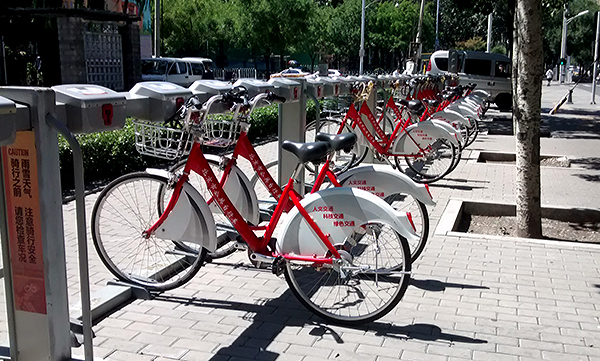
Rumor has it that it this event may become a World Cup next year. Next time around we will know exactly what to expect…which is to expect the unexpected in the fascinating world of China!

